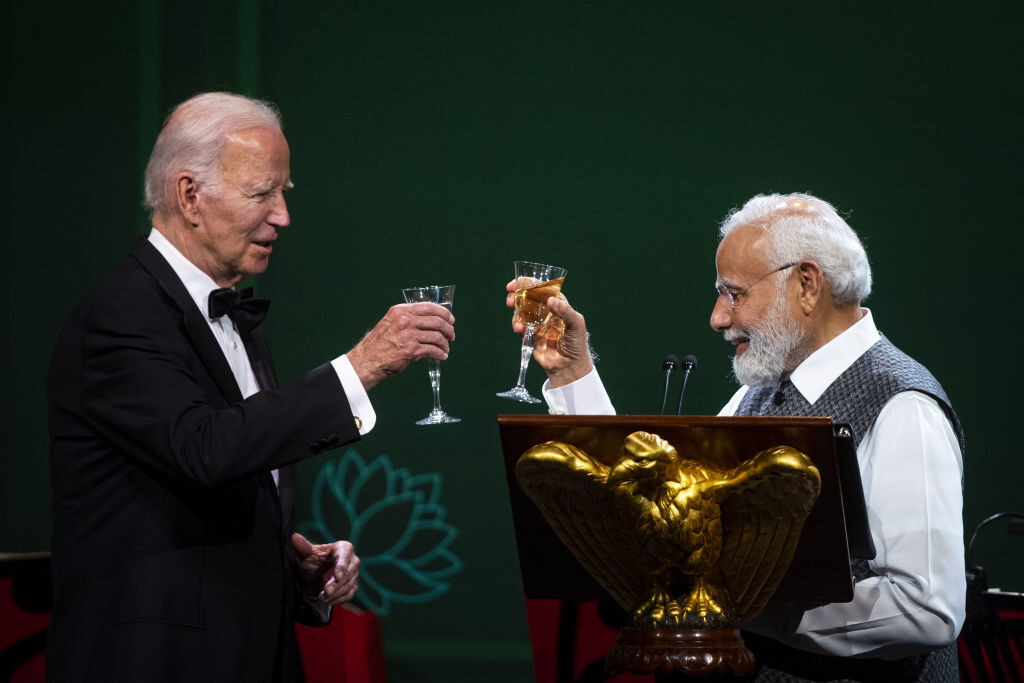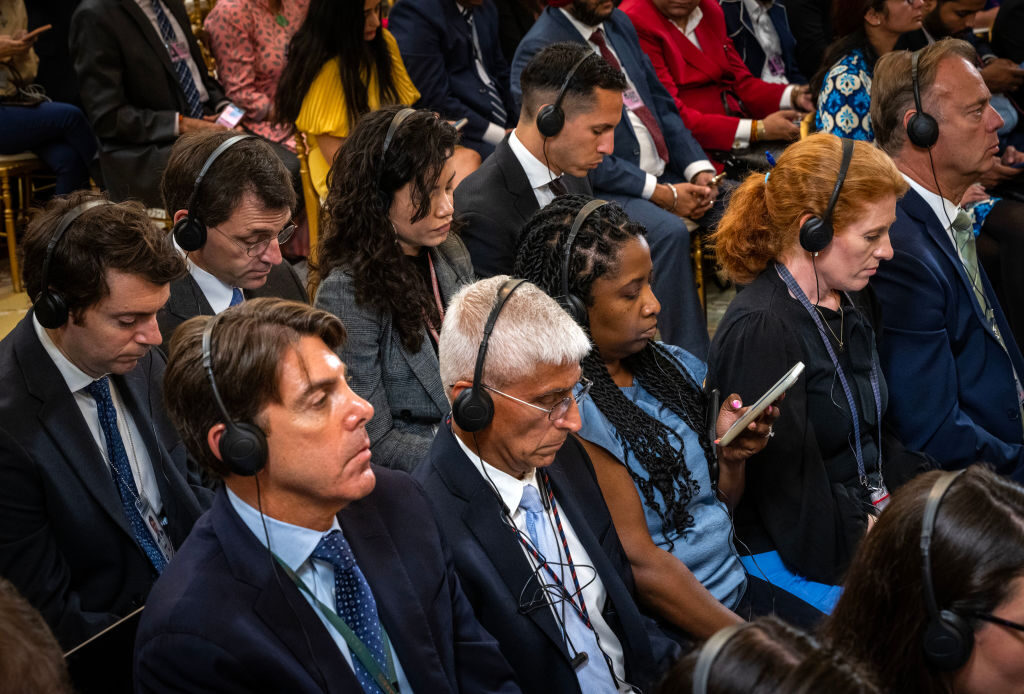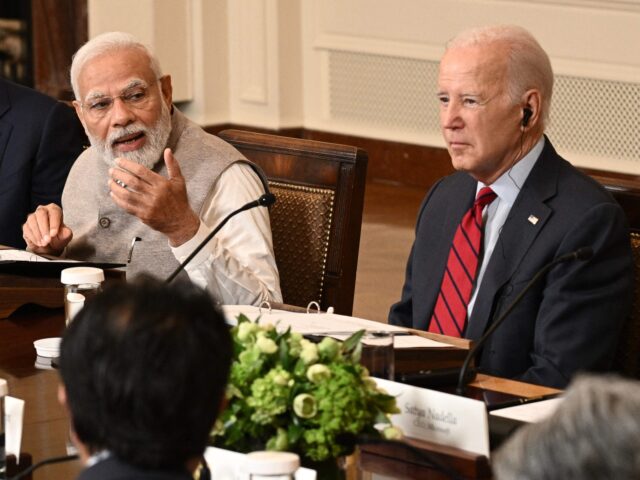Indian Prime Minister Narendra Modi expressed shock on Thursday when confronted about the dramatic escalation in violence against non-Hindu religious minorities in his country during his tenure, claiming to be “really surprised” and denying any religious discrimination.
Modi, of the Hindu nationalist Bharatiya Janata Party (BJP), has been prime minister since 2014, a time period during which human rights groups have documented a marked increase in mob attacks against Christians, clashes between Hindu and Muslim communities, and the use of anti-religious conversion and “love jihad” laws to repress non-Hindus. While the BJP is not orchestrating top-down persecution of such religious groups out of New Delhi, evidence compiled by journalists and human rights activists suggest police do little to prevent violent mob attacks and lynching against Christians and Muslims and the BJP generally is, at best, disinterested in protecting religious rights.
Modi rarely conducts interviews or takes questions from journalists. He responded to a journalist’s question about religious freedom concerns on Thursday at the White House during a joint press conference with leftist President Joe Biden while on a state visit to America.
“What steps are you and your government willing to take to improve the rights of Muslims and other minorities in your country and to uphold free speech?” a journalist asked Modi.
“I’m actually really surprised that people say so. And so, people don’t say it. Indeed, India is a democracy,” Modi said.
“Our government has taken the basic principles of democracy. And on that basis, our constitution is made and the entire country runs on that — our constitution and government,” Modi responded. “We have always proved that democracy can deliver. And when I say deliver, this is regardless of caste, creed, religion, gender. There’s absolutely no space for discrimination.”
“These are our foundation principles, which are the basis of how we operate, how we live our lives. In India, the benefits that are provided by the government is accessible to all,” Modi continued. “Whoever deserves those benefits is available to everybody. And that is why, in India’s democratic values, there’s absolutely no discrimination neither on basis of caste, creed, or age, or any kind of geographic location.”

U.S. President Joe Biden, left, and Narendra Modi, India’s prime minister, toast during a state dinner at the White House in Washington, DC, US, on Thursday, June 22, 2023. (Al Drago/Bloomberg via Getty)
Modi did not offer any examples of steps he or his government are willing to take to improve the rights of Muslims and other minorities in his country and to uphold free speech.
The U.S. State Department condemned widespread violations in India throughout 2022 in its latest Report on International Religious Freedom, published this spring. Most such violations were at the hands of local governments, such as multiple incidents of government officials “bulldozing Muslim-owned homes and shops,” the arrests and public humiliation of non-Hindus, and attacks on Christians for alleged acts of “conversion.”
“Attacks on members of religious minority communities, including killings, assaults, and intimidation, occurred in various states throughout the year,” the State Department detailed. “These included incidents of ‘cow vigilantism’ against non-Hindus based on allegations of cow slaughter or trade in beef and incidents in which Muslim men were alleged to have married Hindu women to convert them.”
“There were also attacks on pastors, disruption of Christian and Muslim worship services, and vandalism of churches,” the report added.
The pontifical charity organization Aid to the Church in Need (ACN) denounced widespread Christian persecution under Modi in its annual religious freedom report, published on Thursday.
“India, with its population of over 1.4 billion, has become a center and breeding ground for religious nationalism. The country, currently ruled by the Hindu nationalist political party the Bharatiya Janata Party (BJP), maintains that Indian culture and identity are rooted in Hinduism,” the report read in part. “The freedoms of religious minorities, especially Christians and Muslims, are severely undermined and especially the practice of religious conversion and cow slaughter invite severe repercussions.”
“The BJP also supports restrictions on religious freedom through the Freedom of Religion Acts (or anti-conversion laws). These are state-level statutes designed to regulate non-Hindu religious conversions allegedly accomplished through forcible and fraudulent means,” Aid to the Church in Need noted.
In conversation with Breitbart News in May, David Curry, the president and CEO of Global Christian Relief, said that India had experienced a “300 percent jump in reported attacks on Christians and Christian churches” since Modi became prime minister in 2014.

The White House press corps listen to a translation as President Biden and Prime Minister Narendra Modi of the Republic of India hold a joint press conference in the East Room of the White House during an Official State Visit in Washington, DC. (Bill O’Leary/The Washington Post via Getty Images)
“The police, the local police, don’t protect the Christian churches and in some ways aid and abet the rioters,” Curry asserted, “so the bigger systemic problem is, why does the central government allow this to happen? Why do local municipalities and policemen allow these attacks against churches and Christians and facilitate it?”
Modi’s poor record on religious freedom prompted protests from far-left American lawmakers regarding the warm welcome Biden offered the prime minister this week. Four leftist members of Congress – Reps. Ilhan Omar (D-MN), Rashida Tlaib (D-MI), Summer Lee (D-PA), and Alexandria Ocasio-Cortez (D-NY) – boycotted Modi’s address to a joint session of Congress on Thursday on the grounds of opposing religious discrimination.
“Prime Minister Modi’s government has repressed religious minorities, emboldened violent Hindu nationalist groups, and targeted journalists/human rights advocates with impunity,” Rep. Omar wrote on Twitter. “I will NOT be attending Modi’s speech. I WILL be holding a briefing with human rights groups to discuss Modi’s record of repression and violence.”
Rep. Tlaib referred to Congress granting Modi a platform as “shameful.”
While most Democrats attended the speech, a much larger group of 75 left-wing lawmakers, led by Sen. Chris Van Hollen (D-MD) and Rep. Pramila Jayapal (D-WA), sent a letter to Biden prior to Modi’s arrival demanding Biden address human rights violations during his conversations with the Indian head of government.
“We do not endorse any particular Indian leader or political party — that is the decision of the people of India — but we do stand in support of the important principles that should be a core part of American foreign policy,” the letter read in part. “And we ask that, during your meeting with Prime Minister Modi, you discuss the full range of issues important to a successful, strong, and long-term relationship between our two great countries.”
Biden made vague references to human rights in his remarks alongside Modi on Thursday.
“Indians and Americans are both peoples who innovate and create, turn obstacles into opportunities, who find strength in community and family, and who cherish freedom and celebrate the democratic values of universal human rights,” the president said, “which face challenges around the world and each — and in each of our countries but which remain so vital to the success of each of our nations: press freedom, religious freedom, tolerance, diversity.”

COMMENTS
Please let us know if you're having issues with commenting.